Postgraduate qualifications vs. job market demands
A significant disconnect exists between the qualifications provided by UK universities and the demands of the UK job market. Data from the Adzuna Intelligence Portal indicates that fewer than 5% of UK job postings require postgraduate qualifications like Master’s degrees or PhDs. In contrast, bachelor’s degree is required for approximately 30% of roles, while 65% of job postings demand lower academic qualifications.
Breaking down job demand by sector for the fiscal year 2023/2024 published in the Adzuna Intelligence portal:
- Postgraduate qualifications (Masters and PhDs) are most sought in:
- Professional, scientific, and technical activities (with a total of 16,746 positions for Master’s, 12,194 for PhDs, and 2,414 for MBAs).
- Education (with a total of 10,878 job positions for PhDs, and 2,119 for Master’s degree).
- Accommodation and Food Services (with a total of 8,565 jobs requiring a Master’s degree).
- Financial and Insurance Activities (with a total of 1,998 vacancies with required MBAs).
- Bachelor’s degrees dominate in:
- Professional, Scientific, and Technical Activities (’33,737).
- Financial and Insurance Activities (’17,830).
- Information and Communication (’13,763).
This suggest that while advanced degrees are valuable in specialised fields, the broader job market is likely to emphasise practical experience, vocational skills, and specific certifications over postgraduate education.
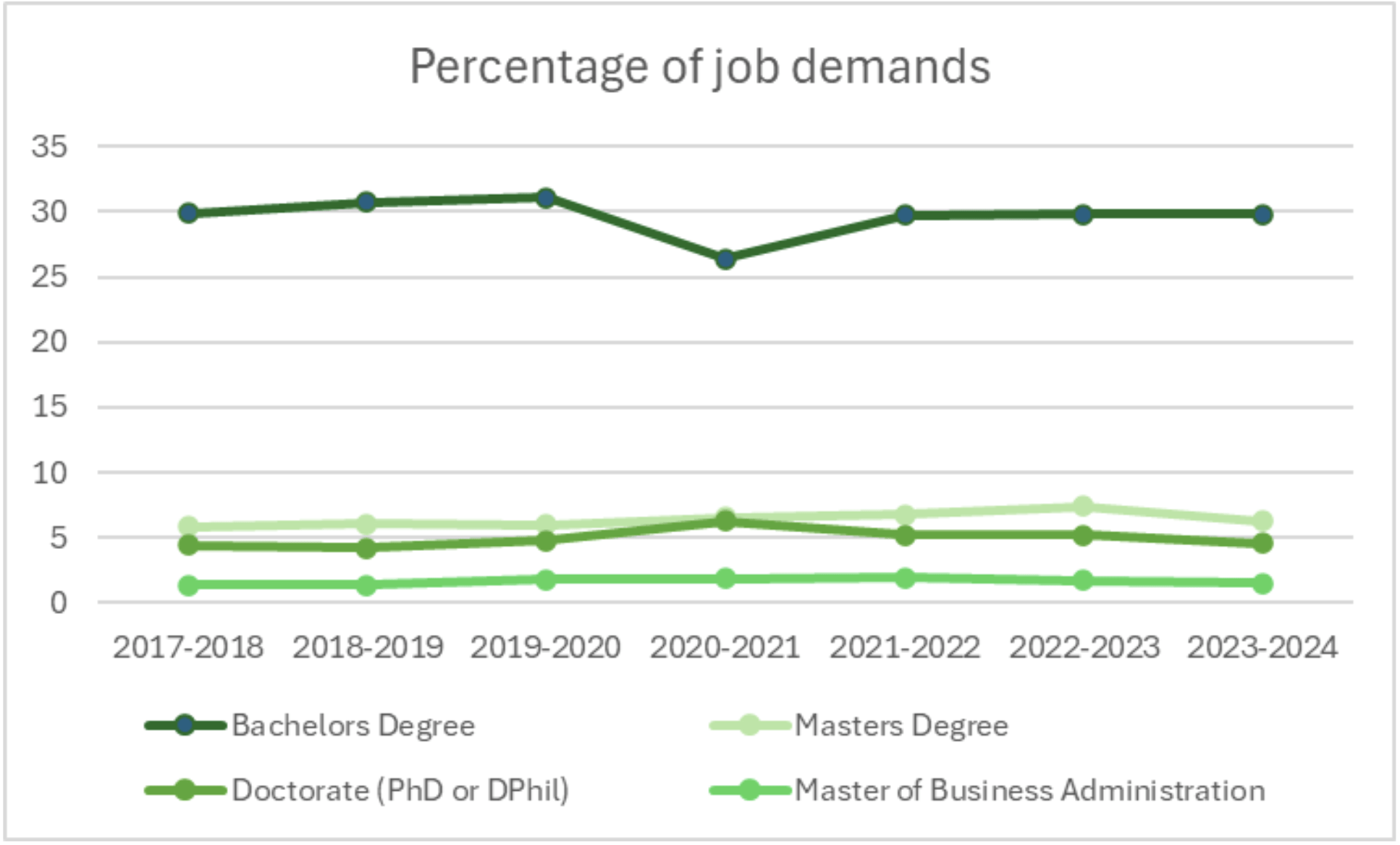
Experience vs education
The emphasis on practical experience is evident in the job demand data. Sectors such as wholesale, retail, trade, healthcare, and accommodation—the top demanded industries in fiscal year 2023/2024 – often prioritise hands-on skills over academic credentials. Surprisingly, 90% of job postings collected do not specify experience requirements. Among those that do, less than 1% demand more than six years of experience, though demand for candidates with 3-5 years of experience has risen compared to those with less than two years.
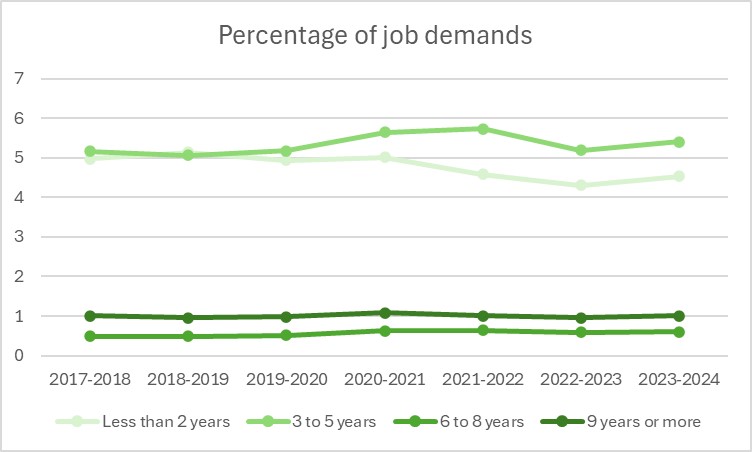
With the Adzuna Intelligence portal we are able to evaluate the association between education and years of experience for the median salaries offered during the same fiscal year 2023/24. The first thing to notice is that higher education does offer financial rewards, but these benefits are nuanced. Median salaries reveal that a Master’s degree generally increases earning potential. However, a PhD only surpasses Master’s-level salaries for roles requiring over six years of experience—a category representing less than 1% of total demand. An MBA, on the other hand, often provides the highest salary premium, particularly in senior positions.
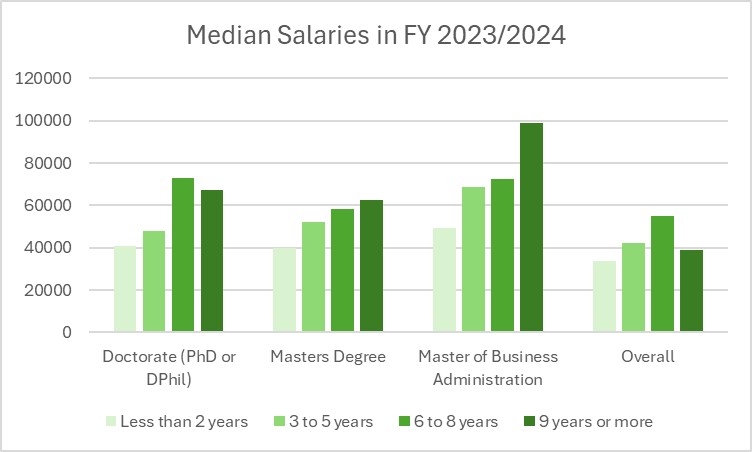
Another approach to better understand the level of experience that is required in the demanded jobs in the UK is when we evaluate data from the Adzuna Intelligence portal distinguishing by seniority level. Similarly with the years of experience, approximately 80% of job postings leave seniority unspecified. Among specified roles, junior and senior positions are most common, each appearing in about 10 and 11% of postings respectively. In addition, post-COVID-19, junior positions have shown consistent growth, potentially reflecting a shift in market needs.
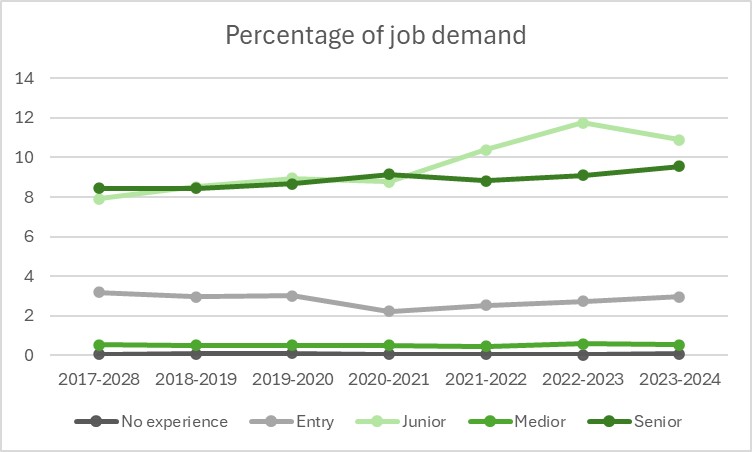
Moreover, by obtaining the median salaries in Fiscal Year 2023/2024 by seniority level, we see again that having post-graduate degrees compensate to the overall salaries. Median salary data by seniority further underscores the financial benefits of postgraduate education. For many roles, the additional years of research and expertise gained through a PhD do enhance earning potential, although Master’s degrees, particularly MBAs, remain highly competitive for senior positions.
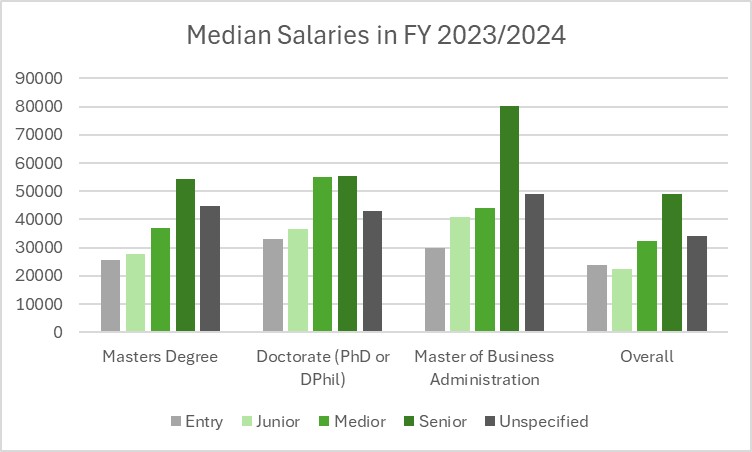
The talent retention dilemma
With its strong academic reputation, the UK attracts a significant number of international postgraduate students. Data from HESA for the academic year 2022/2023 highlights 455,780 international postgraduate enrolments compared to 426,515 UK postgraduate students. Overall, 758,855 overseas students were enrolled in UK universities, compared to 2,175,530 UK citizens. While international students contribute to the UK’s academic and economic ecosystem, many face barriers upon graduation, including a labour market that undervalues their qualifications and restrictive visa policies. As a result, this highly educated talent often migrates to other countries that better recognise their degrees.
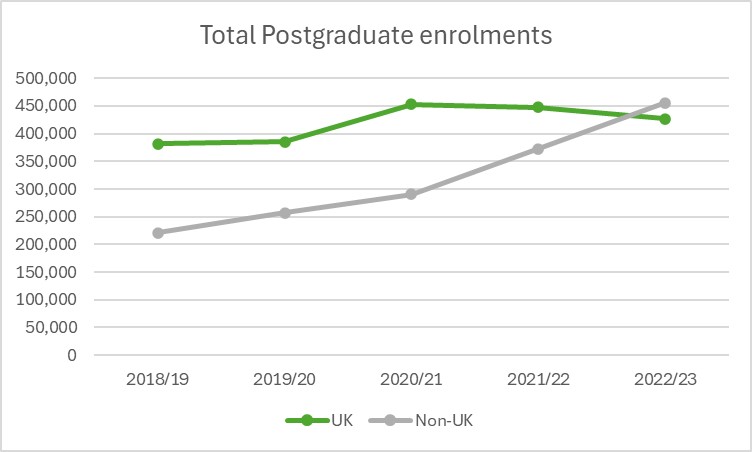
The underrepresentation of UK citizens in postgraduate programs may stem from socioeconomic barriers. According to the Institute for Employment Studies, fewer than one in five young people from lower social class groups pursue higher education. This inequality limits the domestic talent pipeline for advanced qualifications, creating a reliance on international students while failing to fully harness local potential.
Is it worth it?
Postgraduate education in the UK offers clear advantages in specialised fields and certain roles, particularly those requiring advanced expertise or specific qualifications like an MBA. However, the overall job market prioritises experience and practical skills over academic credentials, limiting the immediate value of advanced degrees for many graduates. For international students, the challenge lies not just in finding roles aligned with their qualifications but also in navigating complex visa requirements. Meanwhile, socioeconomic barriers prevent many UK citizens from accessing postgraduate opportunities, exacerbating talent retention challenges. For postgraduate education in the UK to truly pay off, a more cohesive strategy is needed to align academic outputs with market demands, support equitable access to higher education, and create pathways for retaining both domestic and international talent in the workforce.
Any views expressed are those of the author and not necessarily those of the Institute as a whole.


